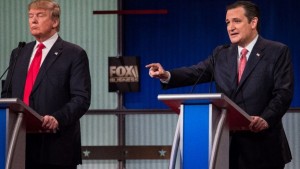(Akiit.com) The primaries march on, with Donald Trump in the lead. But he doesn’t have a lock on the Republican Party nomination. He needs to win more than half of the remaining delegates, no easy task while facing his two toughest opponents. But apparently he’s afraid to share a stage with them again.
The debates matter now more than before.
First, the next couple months will determine whether any candidate wins the race outright, and who will hold the edge if there is a contested convention. The last Republican Party voters soon will have to make their decisions.
Second, Donald Trump faces his two toughest opponents. The candidates scoring an asterisk or slightly better are out. Only Ted Cruz and John Kasich, who defeated Trump in the most important contests—including Iowa, whose residents saw the most of the candidates, and Texas and Ohio, key states in the South and Midwest—remain. Trump should earn the nomination by demonstrating that he’s better than these opponents.
Third, with only three candidates the debates can devote far more time to substance. The events started out as superficial gabfests,  which suited Trump’s style. Shout a little, toss out some insults, offer a few non sequiturs, and divert attention from the real issues. Trump is no fool and so far he’s played a winning game. But it is time for him to match wits with a leading conservative senator and the governor of a major state who previously served in the House.
which suited Trump’s style. Shout a little, toss out some insults, offer a few non sequiturs, and divert attention from the real issues. Trump is no fool and so far he’s played a winning game. But it is time for him to match wits with a leading conservative senator and the governor of a major state who previously served in the House.
Consider the issues that deserve to be debated. With a Supreme Court vacancy, what do the candidates believe are the most important qualifications for the next nominee? Are they committed to a Constitution granting only limited authority to the federal government? Would they follow the nation’s fundamental law if elected?
Over the next decade the federal deficit is on track to climb back above a trillion dollars. Do the candidates believe it is possible to reverse that growth? What hard decisions would they make to do so? Are they prepared to face down the usual special interests—big business, farmers, teachers, welfare advocates, labor unions, seniors?
Immigration represents one of the greatest failures of our political elite. But what are the candidates prepared to do in practice to solve the problem? Which candidates understand that more is required than empty sloganeering and threats? Who can reconcile a party badly divided over the issue?
Boastful claims are even most dangerous when dealing with murderous foreign adversaries. How is the Islamic State to be defeated? What to do about a rising China? Is it America’s responsibility to solve the Syrian civil war? How can Washington wean its European defense dependents?
The Obama administration has boosted welfare spending and reversed some of the Reagan-inspired reforms. The remaining GOP candidates take radically different positions on this issue: Social Security is bankrupt but Trump opposes any change; Medicaid spending is rising even faster but Kasich expanded the program in his state. In contrast, Cruz prefers tougher reforms. Which candidate has the best approach for the future?
So far we haven’t heard much more than sound bites from the candidates on these and other important issues. With the number of candidates down to three, however, in upcoming debates they could truly challenge each other while being prodded and probed by the moderators.
But now, suddenly, Donald Trump has a “scheduling conflict.” Maybe that’s better than being scared off by Fox commentator Megyn Kelly, the reason he last skipped a Fox debate. Not much better, however. Since he’s refused to commit to future debates, maybe he really is scared – and not of Megyn.
Seeking the presidency is serious business. If Trump can’t compete with Kasich and Cruz in a debate, he shouldn’t be the nominee. If he can’t explain his candidacy, he doesn’t deserve the votes of dedicated Republicans.
Worse, if he doesn’t believe he can fend off Kasich and Cruz, how does Donald Trump expect to overcome Hillary Clinton, the likely Democratic nominee? Given his lead, he just might be able to coast to the nomination by avoiding his last two GOP competitors. However, the Clintons and their Democratic machine will give him no mercy come November.
Debates are necessary for voters to make an informed choice. Confident candidates are eager to engage their opponents. Ronald Reagan was never afraid to debate. Before running for president he took on such imposing figures as Robert Kennedy and William F. Buckley. Reagan’s debate with President Jimmy Carter sealed his victory in the 1980 campaign.
If Donald Trump wants to be the champ, he should prove he is qualified for the job by getting back in the ring with the other Republican contenders.
Columnist; Ken Blackwell
Official website; http://twitter.com/kenblackwell









Leave a Reply